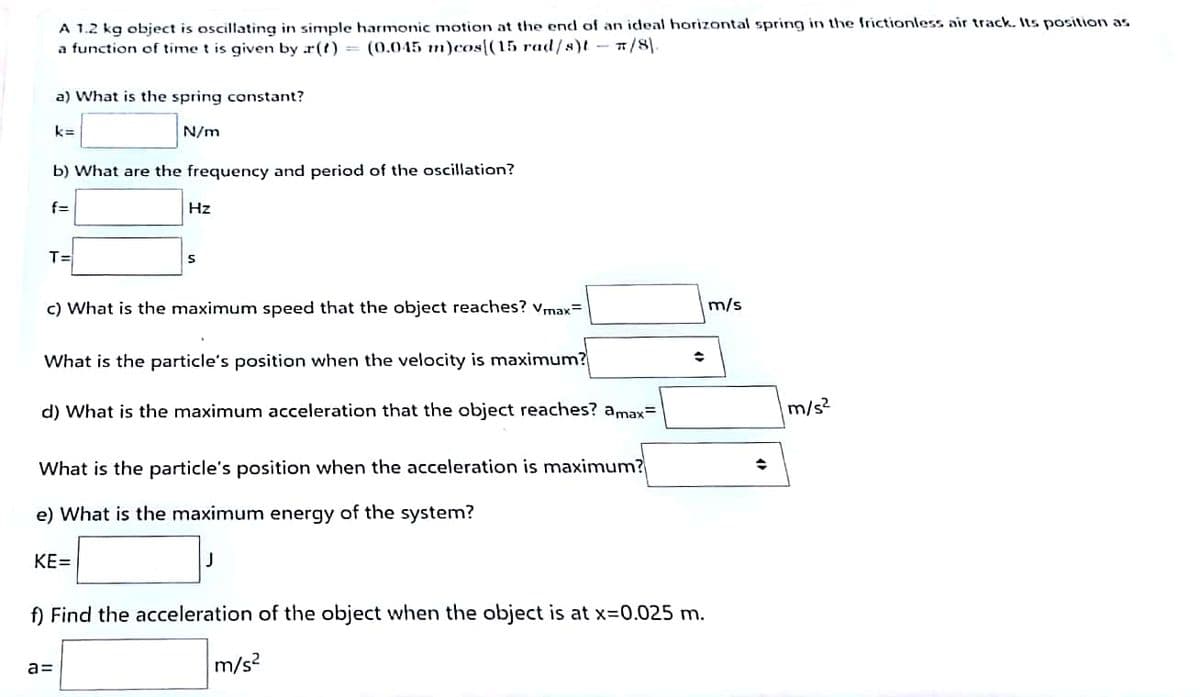A 1.2 kg object is oscillating in simple harmonic motion at the end of an ideal horizontal spring in the frictionless air track. Its position as a function of time t is given by r(t) = (0.045 m)cos (15 rad/s)t- 7/8. a) What is the spring constant? k= N/m b) What are the frequency and period of the oscillation? f= Hz T= c) What is the maximum speed that the object reaches? vmax= m/s
A 1.2 kg object is oscillating in simple harmonic motion at the end of an ideal horizontal spring in the frictionless air track. Its position as a function of time t is given by r(t) = (0.045 m)cos (15 rad/s)t- 7/8. a) What is the spring constant? k= N/m b) What are the frequency and period of the oscillation? f= Hz T= c) What is the maximum speed that the object reaches? vmax= m/s
Elements Of Electromagnetics
7th Edition
ISBN:9780190698614
Author:Sadiku, Matthew N. O.
Publisher:Sadiku, Matthew N. O.
ChapterMA: Math Assessment
Section: Chapter Questions
Problem 1.1MA
Related questions
Question

Transcribed Image Text:A 1.2 kg object is oscillating in simple harmonic motion at the end of an ideal horizontal spring ir the frictionless air track. Its position as
a function of time t is given by r(t) = (0.045 m)cos[(15 rad/s)t - /8).
a) What is the spring constant?
k=
N/m
b) What are the frequency and period of the oscillation?
f=
Hz
T=
c) What is the maximum speed that the object reaches? vmax=
m/s
What is the particle's position when the velocity is maximum?
d) What is the maximum acceleration that the object reaches? amax=
m/s?
What is the particle's position when the acceleration is maximum?
e) What is the maximum energy of the system?
KE=
J
f) Find the acceleration of the object when the object is at x=0.025 m.
m/s2
a=
Expert Solution
This question has been solved!
Explore an expertly crafted, step-by-step solution for a thorough understanding of key concepts.
This is a popular solution!
Trending now
This is a popular solution!
Step by step
Solved in 3 steps with 6 images

Knowledge Booster
Learn more about
Need a deep-dive on the concept behind this application? Look no further. Learn more about this topic, mechanical-engineering and related others by exploring similar questions and additional content below.Recommended textbooks for you

Elements Of Electromagnetics
Mechanical Engineering
ISBN:
9780190698614
Author:
Sadiku, Matthew N. O.
Publisher:
Oxford University Press

Mechanics of Materials (10th Edition)
Mechanical Engineering
ISBN:
9780134319650
Author:
Russell C. Hibbeler
Publisher:
PEARSON

Thermodynamics: An Engineering Approach
Mechanical Engineering
ISBN:
9781259822674
Author:
Yunus A. Cengel Dr., Michael A. Boles
Publisher:
McGraw-Hill Education

Elements Of Electromagnetics
Mechanical Engineering
ISBN:
9780190698614
Author:
Sadiku, Matthew N. O.
Publisher:
Oxford University Press

Mechanics of Materials (10th Edition)
Mechanical Engineering
ISBN:
9780134319650
Author:
Russell C. Hibbeler
Publisher:
PEARSON

Thermodynamics: An Engineering Approach
Mechanical Engineering
ISBN:
9781259822674
Author:
Yunus A. Cengel Dr., Michael A. Boles
Publisher:
McGraw-Hill Education

Control Systems Engineering
Mechanical Engineering
ISBN:
9781118170519
Author:
Norman S. Nise
Publisher:
WILEY

Mechanics of Materials (MindTap Course List)
Mechanical Engineering
ISBN:
9781337093347
Author:
Barry J. Goodno, James M. Gere
Publisher:
Cengage Learning

Engineering Mechanics: Statics
Mechanical Engineering
ISBN:
9781118807330
Author:
James L. Meriam, L. G. Kraige, J. N. Bolton
Publisher:
WILEY